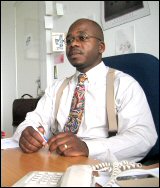4 May 2004
MediaNews 14 - May 2004
Scoop: Mozambican academic degree in journalism
News
By Barbara Bosma
For the first time, Mozambicans are offered an opportunity to obtain an academic degree in journalism. The Universidade Eduardo Mondlane in Maputo has initiated the study as of this academic year. "We want to educate students into gaining a new outlook on journalism." The new School of Communication and Arts (Escola de Comunicação e Artes) of Mozambique’s Eduardo Mondlane University offers a four-year training.
The course has attracted overwhelming interest, according to the school’s principal, Eduardo Namburete. No less than 1,100 students applied, while there was only room for 65 in the first year. Next year the school will start courses in Arts. Eventually Namburete hopes to be able to accommodate 1,500 students.
Up until now there was no place where Mozambicans could follow quality and affordable courses in journalism. The existing Mozambican School of Journalism offers no academic degree and the quality of its teaching is considered rather poor.
There is also a private university (Instituto Superior Politécnico e Universitário) offering courses, but it does not attract that many applicants. Eduardo Namburete: "As a journalist you’re not going to earn a lot of money, so you can’t afford expensive education."
Cultural awareness
 | | Eduardo Namburete |
The principal, who holds several degrees in journalism and a Masters in communication, said he wanted to use the first year primarily to provide students with general knowledge in economics, sociology and information science. For this, Namburete will be calling on the services of teachers from other branches.
In the second and third year there will allow for growing specialisation, with subjects such as mass communication, the history of journalism and media ethics. The fourth year is reserved for practical training.
The school co-operates with other institutions, including the University of North Texas (US) and the University of São Paulo (Brazil). Computer and library facilities will have to be shared with other departments on the campus. However, the school plans to have its own radio station.
Namburete explains: "Together with our students we want to make community radio programmes that will inform listeners on, for instance, cholera and aids, as a contribution to society and a means that will enable prospective journalists to gain practical experience."
Namburete said getting attention and funds for media development in Mozambique was rather difficult. ‘It doesn’t fit in with the international organisations’ perception of development work.
These organisations tend to focus on improving the economy. However, if you consider development from another angle, journalism is valuable. It contributes to the development of democracy and national and cultural awareness."
Nothing but the truth
Namburete believes that little interest in the development of independent media can be found on the part of international organisations. And apparently the same goes for the Mozambican government. "The government keeps regarding independent media as a threat", he says.
Even now that the freedom of expression is incorporated in the Constitution, the government tries to control the media, e.g. by controlling printing presses, raising newsprint prices and refusing to subsidise newspaper transports to other provinces, said Namburete.
The principal denounced the entanglement of politics and the media. He said newspapers were biased: "Many journalists serve their bosses, not their readers. In order to make stories out to be better than they really are, for the benefit of the parties they support, they distort the facts. Thus a news item can be a completely different story in different papers. Of course, there should be room for various perspectives in news reporting. But what every journalist should report in the first place is the facts, not her or his opinion."
The most important lesson he wants to convey to the students is therefore that they should be committed to "the truth and nothing but the truth. In four years’ time I want to turn out journalists that are proud of their profession. Those that view themselves as being committed to their country and people, not to politicians or editorial boards. That regard it their duty to provide their readers with information about their country, thus enabling people to judge for themselves." Barbara Bosma works in Mozambique as an independent journalist.
Universidade Eduardo Mondlane: www.uem.mz
|

